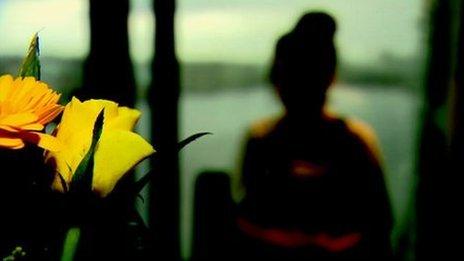Reports of child abuse rising sharply, NSPCC says
- Published
Jon Brown, NSPCC: "There is not enough support available for children who have been sexually abused"
The number of recorded sexual offences against children in England and Wales has risen by a third, the NSPCC says.
There were 31,000 offences recorded in the year up to April 2014, up 8,500 on the previous year.
Figures compiled by the charity, external show 85 offences were recorded by police every day, with significant rises in Scotland and Northern Ireland also.
A spokesman said high-profile cases had "played a contributory factor" in encouraging people to come forward.
Jon Brown, from the NSPCC's sexual abuse programme, told BBC Radio 4's Today that cases in Rotherham, Rochdale, Oxford and elsewhere had helped prompt "children, young people and adults to speak about abuse that is either happening to them or has happened to them".
BBC home editor Mark Easton said police forces had put significant effort into encouraging victims to come forward and this appeared to be paying off.
It is probable sexual offences are actually falling despite cases coming to light in recent years, he added.
'Agonising wait'
Chief Constable Simon Bailey, the National Police Chiefs Council (NPCC) lead for child protection, said police now looked "upon child abuse very differently".
"Many, many, more" people had found the confidence to report incidents, he said, but the latest figures could be still only be "the tip of the iceberg".
And Peter Wanless, the NSPCC's chief executive, said the figures were "a fraction of the true number of victims, because some endure an agonising wait of many years before telling anyone - and others never reveal what has happened to them".
According to the figures, compiled by a Freedom of Information request:
Most of the victims were aged between 12 and 16
But 8,282 were younger than 11. Of those, 2,895 were estimated to be aged five or under, including 94 babies
Some 24,457 of the reported abuse cases were against girls, with 5,292 against boys
The Metropolitan Police recorded the highest number of sex crimes against children, with 3,523
In 2012/13, the same research showed 22,654 cases were recorded by 41 police forces. All 43 forces in England and Wales responded in the latest study.
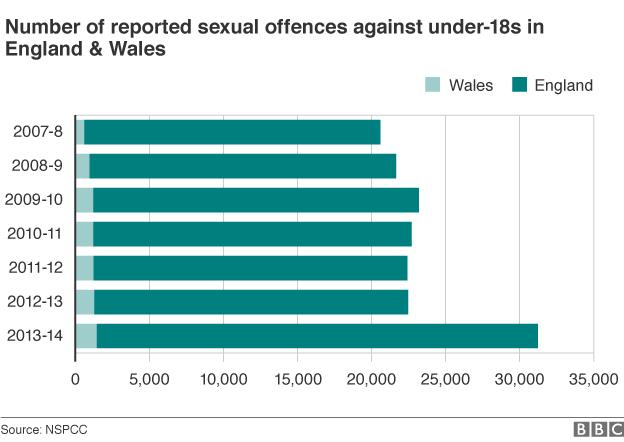
The NSPCC said the total had largely remained steady until this year's figures, and that the 38% rise was the biggest increase in six years of requesting the data.
The number has now increased by almost 50% since 2008/09.
In Scotland, government figures showed that in 2013-14 there were 3,742 sexual offences against children under 18 recorded, including rape, sexual assault and grooming - a 10-year high.
The NSPCC said 1,485 sexual offences against people under 18 were reported to police in Northern Ireland in 2013/14, up 26% on the previous year.

Analysis
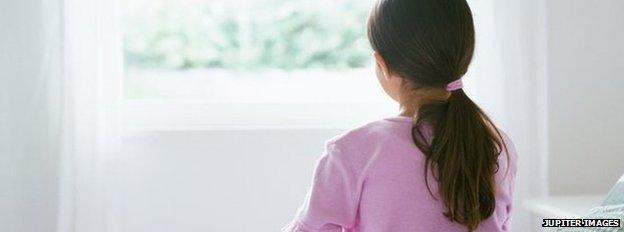
By Mark Easton, BBC home editor
The fact that police are recording more suspected incidents of child sexual abuse should probably be regarded as a positive development.
Police forces have put significant effort into encouraging victims of such crimes to come forward and this seems to be paying off. Prosecutors and chief constables are under instruction to take seriously allegations that are made and, where appropriate, revisit reports made in the past.
Britain is only beginning to recognise the appalling scale of child abuse and the criminal justice system still only deals with a fraction of offences. It is possible - indeed the recent focus on child welfare and big falls in overall violent crime makes it probable in my view - that sexual offences against children are falling, despite all the horrific cases that have come to light in the last few years.
However, while more victims coming forward is good news, it is vital that the resources and support are available to deal with the increased demands on police and other services.

The NSPCC's Mr Brown said there was not enough support available for children who had been sexually abused.
"Their concerns need to be taken seriously and acted promptly upon.
"Through the court process they need to be supported and there are some real gaps there, and then there's a huge gap in the amount of help and therapy that's available for children who have been abused."
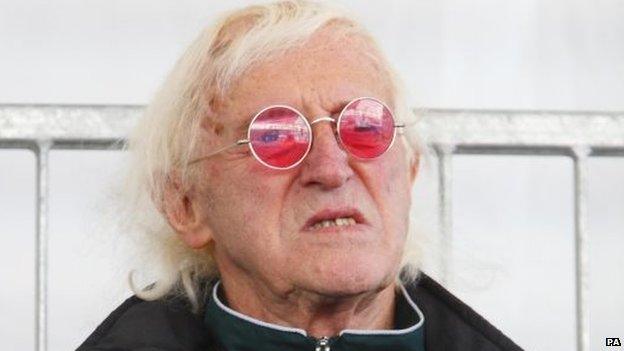
The NPCC said it had seen an increase in cases since abuse by Jimmy Savile came to light
Mr Brown said the charity estimated that there was a shortfall of 50,000 places across the UK for children who needed treatment, having been sexually abused.
The figures are published as the NSPCC launches its third annual "How Safe Are Our Children?" report at the charity's annual conference in London.
A government spokeswoman said children must be protected from "systemic and appalling cases" of abuse such as those seen in Rotherham, Rochdale, Oxford and elsewhere.
'Unprecedented increase'
She said: "We have given child sexual abuse the status of a national threat so that it is prioritised by every police force, will shortly launch a new child sexual abuse taskforce and centre of expertise to improve local responses and we have provided £7m funding to organisations that support victims.
"It is encouraging that police figures show more victims are having the confidence to come forward and report these often ignored and under-reported crimes."
Home Secretary Theresa May has established an independent inquiry to probe allegations of historical child sex abuse and a Westminster paedophile ring.

Analysis
By Danny Shaw, BBC home affairs correspondent
Over the past 18 months there's been a raft of data indicating that more people are reporting sexual offences.
What's different about these statistics is that there's a breakdown by age of victim, enabling us to see the extent of the problem as it affects children. It's a deeply worrying picture.
It raises questions about the level of support available for victims, at a time when criminal justice, welfare and health budgets are under strain, as well as the need to find ways to deal effectively with the perpetrators.
To do that we must attempt to understand what drives people to commit offences against children and babies, however unpalatable that may be, to prevent further crimes in the future.

Last month it emerged that police were investigating more than 1,400 prominent men for historic child sex abuse, including politicians, celebrities and those linked to institutions.
And also last month, the NPCC said it had seen an "unprecedented increase" in the number of reports of abuse following the Savile cases coming to light.
Mr Bailey said of the latest figures: "The service now looks upon child abuse very differently and victims can expect a professional response.
"As a result many, many, more victims have found the confidence to report abuse, knowing they will be treated with sensitivity and respect, that we will listen to them and that we will take their allegations seriously."
- Published17 June 2015
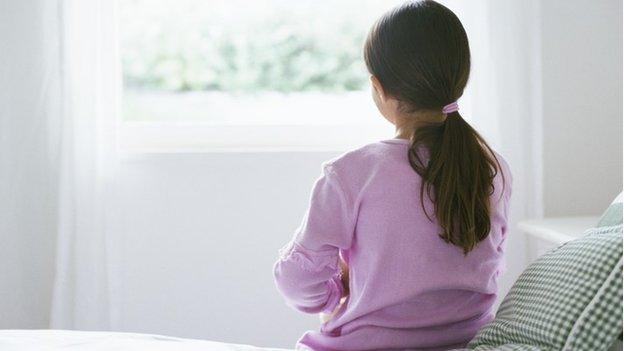
- Published20 May 2015
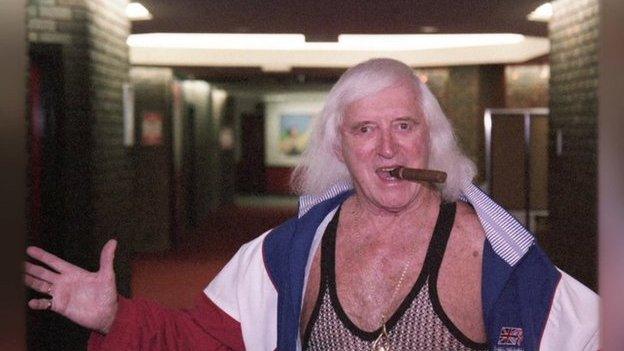
- Published20 May 2015
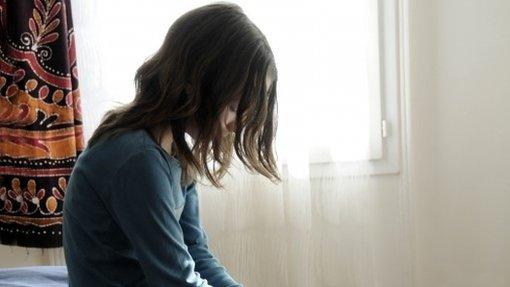
- Published4 February 2015
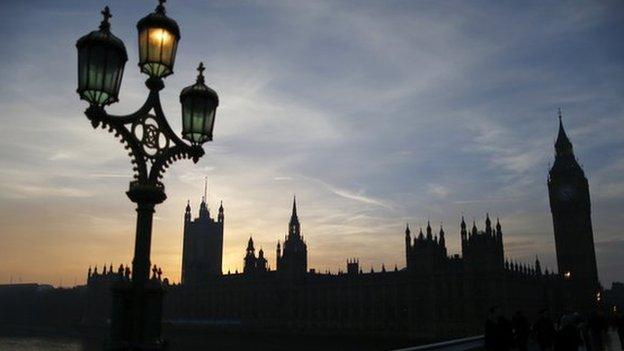
- Published26 August 2014
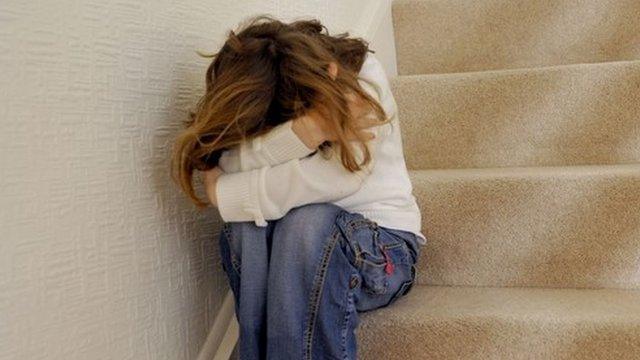
- Published5 February 2015
